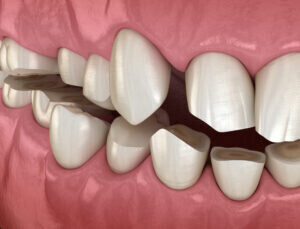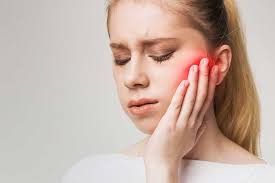Your teeth and jaws under pressure
February 11th, 2021
Do you clench your teeth when you are feeling stressed? Do you wake up with a headache? Do your jaw muscles hurt? Call our office for an appointment. You may have a habit called bruxism.
WHAT IS BRUXISM?
Bruxism is a habit during which you grind your teeth or clench or thrust your jaw forward over and over again. This habit can affect you’re your oral health. It can cause teeth to break or crack, and increase the chance of gum problems. Adults are not the only ones affected. Studies have found that this can be a problem in children as young as preschool aged.
WHAT CAUSES IT?
Researchers do not know for sure what causes people to do this. Some think stress could be a factor. In preschoolers, studies find an association between grinding their teeth or clenching their jaws and signs of stress such as anxiety or social withdrawal.
Children also can develop this habit when they are losing their baby teeth and their permanent teeth are coming in. Nail biting also may lead to grinding of teeth or jaw clenching. Some children outgrow this, but often adults who grind their teeth or clench their jaws did so as children.
Like many habits, you may be unaware that you do this. You may even do it in your sleep. Tobacco and alcohol use may increase your chances of doing this when you are sleeping. Large amounts of caffeine--for example, 8 or more cups of coffee a day—also can increase this risk. Some medications or illegal drugs may cause users to grind their teeth or clench or thrust their jaws as well.
WHAT CAN YOU DO?
You should contact our office if you notice any of the following:
- Jaw pain
- Headaches when you wake up
- Teeth sensitivity to hot or cold drinks or food
- Chipped teeth or fillings
A number of things can contribute to the problem of bruxism, and there has not been a lot of research on how best to treat it. We may suggest some options, such as:
- Decreasing or quitting tobacco use
- Limiting how much caffeine you eat or drink
- Seeking counseling to help you identify when you are doing it while you are awake to develop ways to relax
- Looking at the medications you take and talking to your physician about other options
We also may talk to you about using an oral appliance, which is a plastic tray that fits over either your top or bottom teeth. Use of an appliance may help reduce grinding, clenching, thrusting and may protect your gums and teeth.








